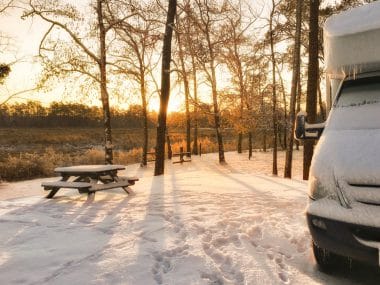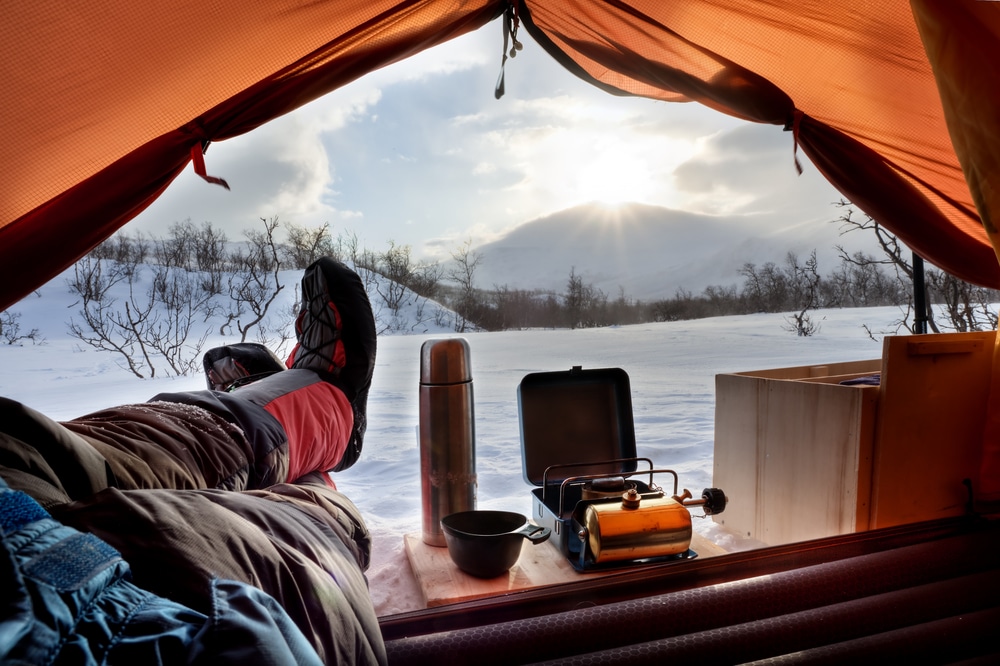Camping in winter – in icy temperatures around freezing point? Camping enthusiasts love to go on holiday with a motorhome even in winter. Even chilblains can be a good thing for a camping holiday in the cold season, when the wanderlust becomes too strong and the mountain calls loudly for you. In the winter months, from the beginning of November to the end of February, the vast majority of campsites are a little more tranquil. Few guests, many free pitches and the absolute tranquility of nature. It is not uncommon for campers to feel like they have the place almost to themselves in winter, if it weren’t for fresh footsteps in the snow or nice encounters on the way to the washhouse, which remind you that there must be other campers on this site. In this article, we have put together helpful tips for you that should be followed when winter camping in order to spend relaxing holidays.
Winter camping tip 1: The campsite
The search for the right campsite in winter begins at home. Of course, many winter campers are attracted by the snowy landscape of the mountains, which is why many campers go to Bavaria or the ski resorts of Austria in winter. Here, the staff at many beautiful campsites await their guests even in winter and by the way, it is often not far to the next ski lift! Some campsites even offer the luxury of a sauna – a highlight for real winter campers. Switzerland and Scandinavia are also exciting holiday destinations for campers in winter.
Winter camping tip 2: The vehicle
No one travels to the mountains in winter without first putting new winter tires on their motorhome, but snow chains should also be packed when traveling to snowy areas. In addition, the camper should be upgraded to be winter-proof and even for temperatures below freezing, keep the heat inside. This means that a functioning heating system should not be missing on board, as well as good insulation of the outer walls of the caravan and the water pipe. Well prepared, the holiday can begin and nothing stands in the way of winter camping.

Winter camping tip 3: The gas supplies
Most heaters in caravans run on propane gas. The gas often consumes faster in winter temperatures than in summer. Depending on the outside temperature, vehicle size and heating requirements, one litre of propane gas lasts for two to five days at most. The filling quantity should be checked at regular intervals while camping. For this purpose, there are special gas measuring devices that warn you of unexpected cold in the vehicle and save every man from having to change the gas bottle at night. Luxury is those who can fall back on a Duo-Control on board: It offers space for two cylinders and automatically switches from the empty to the full gas bottle. In winter, heating and ventilation are immensely important! Above all, shock ventilation protects against mold inside the vehicle. For this reason, winter campers should not hang damp clothing in the camper to dry. Most campsites have suitable drying rooms.
Winter camping tip 4: The water
If you want to camp in winter, you should make sure that the water pipes are well insulated. Heated water tanks ensure that unexpected frost damage to the water system cannot occur. The waste water tank, on the other hand, is often not heatable. Therefore, you should let the wastewater drain directly. Some campers also resort to an old trick and pour some antifreeze into the sink. It seeps into the pipes and thus ensures that they do not freeze. To prevent the water boiler from freezing in winter, it usually has a clever antifreeze monitor. A really great invention!
Winter camping tip 5: The current
In winter, the on-board battery provides less power and, like a car, can quickly break down. In addition, electricity consumption usually increases in winter. That’s why winter campers use a fixed electricity connection at the site. That’s a good idea!
Winter camping tip 6: The awning
Setting up an awning is tedious at any time of the year, but especially in winter you quickly get cold fingertips. Nevertheless, the awning offers some great advantages, especially in the winter months. On the one hand, it serves as a cold lock and useful dirt trap for wet shoes. In addition, the awning is also a popular storage space in winter. After all, skis, ski boots or the large wooden sled also want to be accommodated and not stand outside in the snow. By the way, the awning is a good refrigerator in winter and without any electricity consumption. Cold drinks or other food can be easily stored in the awning. If you like to sit outside and watch the snow flurry, but don’t want to freeze, you can use the awning as a conservatory and heat the tent with a kerosene heater.
Winter camping tip 7: The tool
The right tool is not only immensely important in summer: Whether hammer or pliers, unforeseeable damage occurs again and again, calling for quick repairs. But a broom, hand brush and snow shovel should never be missing on board in winter. Have you also thought of an ice scraper with a telescopic pole to easily and quickly remove snow and ice from the windows and roof of the caravan in the event of heavy snowfall or freezing wetness? Be sure to remove the snow from the roof of the awning as well. Large masses of snow endanger the stability of the roof and make it a danger to humans and animals, because it could simply collapse under the weight of the snow. You must also clear the pavements of your plot and sprinkle salt if necessary, just like in your garden at home. Space-saving shovels that can be folded can be bought in camping shops.
Winter camping tip 8: The thermal cover
Thermal hoods are particularly suitable for retaining heat in the motorhome. They provide additional insulation for the vehicle. The hoods are very easy to attach and work without any problems after mounting on the vehicle. All you have to pay attention to is the right size of the thermal cover when buying! In some motorhomes, thermal bridges are already in the driver’s cab. It is best to cover the windows every evening so that the large panes remain ice-free. For the foot area of a caravan, specially cut thermal mats can be bought from specialist retailers. For camper vans, on the other hand, an additional interior trim, especially on the doors, is a good idea. There can be a lot of draught through the slits of the doors. Pop-up roofs of caravans and small camper vans can also be easily insulated with thermal mats. This works very well, at least at temperatures down to minus two degrees, and allows campers to fall asleep better in winter. However, I rather doubt whether the insulation is sufficient for high minus straights.
Winter camping tip 9: The clothes
Warm clothes should not be missing when winter camping! People with experience in camping on icy winter days wear warm thermal underwear under thick ski clothing and it is not uncommon to see self-knitted wool socks from grandma on their feet. Thermal blankets, thick seat cushions, sheepskin and warm beaver bedding are part of the basic equipment of every winter camper, along with warm clothing. Of course, sunglasses can also be taken out of the case again. Because on sunny snowy days on the mountain, it is definitely needed. And if you do shiver from the cold, the only thing that will help is a hot tea. So you are sure to thaw again quickly!
Winter camping tip 10: Enjoy, enjoy, enjoy
Camping in winter is not only a great way to unwind and relax for a few days, but also to get really active at the same time. Countless winter sports such as skiing, ice skating or a hike with snowshoes invite winter campers to unforgettable tours. Of course, a large snowman must also be built in front of the caravan. In the evening, good old acquaintances are already waiting for you at the self-built ice bar and you can exchange the news of the past year over hot drinks and delicious food. By the way: Barbecuing is especially fun in winter! Don’t do without the barbecue even in winter. A bratwurst on icy days is just damn delicious!


